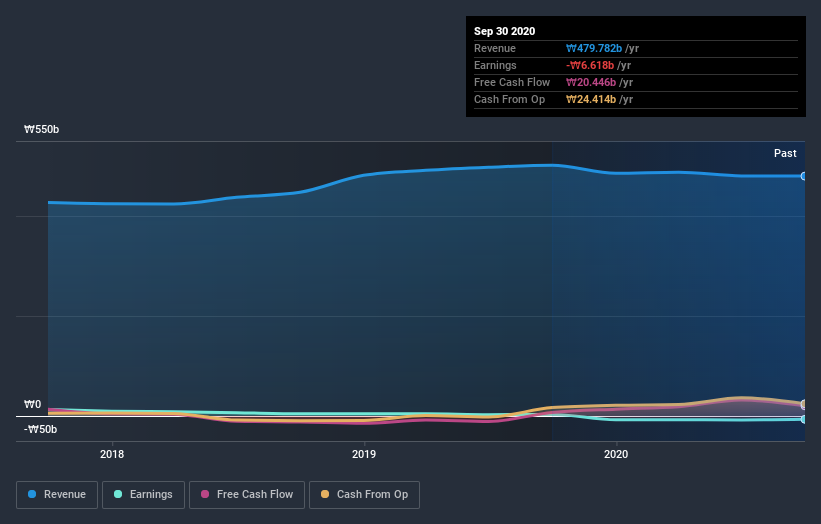- South Korea
- /
- Basic Materials
- /
- KOSE:A004090
Update: Korea Petroleum Industries (KRX:004090) Stock Gained 12% In The Last Three Years
Investors can buy low cost index fund if they want to receive the average market return. But if you invest in individual stocks, some are likely to underperform. For example, the Korea Petroleum Industries Company (KRX:004090) share price return of 12% over three years lags the market return in the same period. Looking at more recent returns, the stock is up 9.5% in a year.
See our latest analysis for Korea Petroleum Industries
To paraphrase Benjamin Graham: Over the short term the market is a voting machine, but over the long term it's a weighing machine. One flawed but reasonable way to assess how sentiment around a company has changed is to compare the earnings per share (EPS) with the share price.
During the three years of share price growth, Korea Petroleum Industries actually saw its earnings per share (EPS) drop 104% per year. This was, in part, due to extraordinary items impacting earning in the last twelve months.
The strong decline in earnings per share suggests the market isn't using EPS to judge the company. So we'll need to take a look at some different metrics to try to understand why the share price remains solid.
Languishing at just 1.3%, we doubt the dividend is doing much to prop up the share price. It may well be that Korea Petroleum Industries revenue growth rate of 5.3% over three years has convinced shareholders to believe in a brighter future. If the company is being managed for the long term good, today's shareholders might be right to hold on.
The company's revenue and earnings (over time) are depicted in the image below (click to see the exact numbers).

If you are thinking of buying or selling Korea Petroleum Industries stock, you should check out this FREE detailed report on its balance sheet.
What About Dividends?
It is important to consider the total shareholder return, as well as the share price return, for any given stock. The TSR incorporates the value of any spin-offs or discounted capital raisings, along with any dividends, based on the assumption that the dividends are reinvested. Arguably, the TSR gives a more comprehensive picture of the return generated by a stock. We note that for Korea Petroleum Industries the TSR over the last 3 years was 17%, which is better than the share price return mentioned above. The dividends paid by the company have thusly boosted the total shareholder return.
A Different Perspective
Korea Petroleum Industries shareholders gained a total return of 11% during the year. But that return falls short of the market. The silver lining is that the gain was actually better than the average annual return of 4% per year over five year. It is possible that returns will improve along with the business fundamentals. It's always interesting to track share price performance over the longer term. But to understand Korea Petroleum Industries better, we need to consider many other factors. To that end, you should learn about the 4 warning signs we've spotted with Korea Petroleum Industries (including 2 which are concerning) .
We will like Korea Petroleum Industries better if we see some big insider buys. While we wait, check out this free list of growing companies with considerable, recent, insider buying.
Please note, the market returns quoted in this article reflect the market weighted average returns of stocks that currently trade on KR exchanges.
If you’re looking to trade Korea Petroleum Industries, open an account with the lowest-cost* platform trusted by professionals, Interactive Brokers. Their clients from over 200 countries and territories trade stocks, options, futures, forex, bonds and funds worldwide from a single integrated account. Promoted
Valuation is complex, but we're here to simplify it.
Discover if Korea Petroleum Industries might be undervalued or overvalued with our detailed analysis, featuring fair value estimates, potential risks, dividends, insider trades, and its financial condition.
Access Free AnalysisThis article by Simply Wall St is general in nature. It does not constitute a recommendation to buy or sell any stock, and does not take account of your objectives, or your financial situation. We aim to bring you long-term focused analysis driven by fundamental data. Note that our analysis may not factor in the latest price-sensitive company announcements or qualitative material. Simply Wall St has no position in any stocks mentioned.
*Interactive Brokers Rated Lowest Cost Broker by StockBrokers.com Annual Online Review 2020
Have feedback on this article? Concerned about the content? Get in touch with us directly. Alternatively, email editorial-team (at) simplywallst.com.
About KOSE:A004090
Korea Petroleum Industries
Manufactures and sells asphalt, solvents, and building materials in South Korea and internationally.
Adequate balance sheet and slightly overvalued.
Market Insights
Community Narratives





